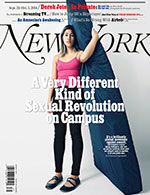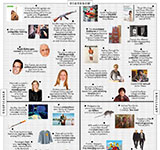“And so,” he said, “we’re dating. To both our credit, it’s a mature response. Because we don’t know each other.”
Later that same day, while she was alone in Northampton, Su and I spoke again.
For more than a month, she’d fallen out of touch. She’d been, she explained, laughing, “a lost lamb.” She’d gone from school and writing “to basically having no purpose.” Her book had achieved admiring reviews but lackluster sales. Being in Northampton, a few blocks from campus, now felt weird. She recalled how close she and her friends had gotten, invoking late-night chats in their dorm rooms. They were all gone, most destined for grad school or jobs and “wonderful, amazing things.” She cannot conjure the future easily, a residual effect of her injury, she believes. “I want to write, do speaking gigs, and I want to rock and roll on my drums,” she said. She did not, however, know how. She has contemplated writing another memoir, or getting a master’s degree in writing or library science. She’d applied for some administrative-assistant jobs on campus. She wants to save money to buy a house; Jim, however, had just used some of their savings to buy himself a motorcycle. She had taken to staying in bed, watching television, not changing out of her pajamas. She’d just turned 49: “That is just so not who I am,” she said.
After a long time, I asked her something I’d been wondering since we’d first met: whether she considers herself to be younger than I (I am 13 years her junior). “Oh my God, yes!” she exclaimed. She cited my house, my car, my job, my credit card. She said, “You are so much older than me!” As such, I felt compelled to offer, and felt she was seeking, some reassurance that what she was experiencing was normal for a recent college graduate. “I feel like I’m supposed to be an adult,” she told me, “and I’m like, Uhhhh.”
Her funk had taken a toll on Jim, too, she said, and their relationship earlier this summer had “gone downhill.” I told her I’d heard from him that they were considering separating or remarrying. “Both thoughts terrify me in different ways,” she said. She reiterated that she did not have a job or a car or a credit card or another viable place to live. (Though her parents have invited her to move in with them, she is reluctant. She told me at one point that while her relationship with them is close, “they’re just like people that I would talk to in town, or my neighbors.”) I told her I found it strange that love never seemed part of her calculus.
“I do care about him,” she said. “I do love him, in a way that’s not … I think about him all the time. I love him in a way, that is, because he’s all I know. I can’t even imagine being with anybody else.” Still, she said, “I love and care about Jim enough to know this marriage is not what he wants it to be.” She said she drives him crazy sometimes. “I ask a lot of questions.” I told her Jim had left me with the impression that he was devoted to her and the marriage.
“That’s fascinating,” she said, “because he’s said I bring out the worst in him and he can’t live like that anymore.” She mentioned a text exchange she’d initiated the day before after a friend from church suggested she text Jim to ask him, simply, if he missed her. Jim responded that it was a “loaded question”; Su said it was not. Jim responded that he did miss her. “That was something to me,” said Su.
“It’s not a terrible idea to get married,” she went on. “I’m certainly not against that. It would probably appear weird to the outside world, but it’s not at all weird to me.” The ceremony would have to be very small, though. And she wishes for more equality in the relationship. There are large issues she wants changed: “The sex, the money, just lifestyle changes …” She invoked, as well, “the violence.” She is “not, like, a religious freak,” but she referenced the story of Adam and Eve, how they are “blissfully ignorant and then they know too much. Suddenly, Smith was the apple that I ate and suddenly I know too much.”
Everything is still new. She wonders now how much volition she’d exercised even in the decision to go to school—her family had pushed her to enroll in Montgomery College, and in many ways a desire for others’ approval propelled her through Smith and even the writing of the book. She knows she’s “never going to be normal.” The effects of her injury will be with her forever, including the horrific moments of depersonalization that still sometimes strike, when she does not know who or what she is. The difference now is she will not hide it. She told me she lives her life “in pursuit of truth.” She hopes that by sharing all of this, she might help people who someday find themselves in positions like hers, or positions like Jim’s.
She believes him. She believes them all. She had not, until I asked her, ever considered the alternative. “I don’t even know the word,” she began—“Hurt doesn’t sound big enough and angry doesn’t sound right. I don’t know how I’d be if I found out that Jim—or even my parents—knew something was wrong and did nothing to get me the help I needed.” She was thinking out loud then. “Because certainly by the ’90s and 2000s, there was more known about head injuries then. Why it wasn’t revisited, I don’t know.” Jim had told her he could only see it now, with the benefit of hindsight. “And I’m like, God, how did you not realize it?”
At the time it all happened, she pointed out, he was roughly Kassidy’s age, the age Su considers herself to be now. He was 24 years old. Su wondered “if people can get to a place where they don’t want to believe something, so they don’t believe it.” She is uncertain whether to include herself among them.
 Subscribe
Subscribe

 The Age of the Auteur in Streaming TV
The Age of the Auteur in Streaming TV
 The Approval Matrix
The Approval Matrix David Edelstein on This Is Where I Leave You
David Edelstein on This Is Where I Leave You
 A Very Different Kind of Sexual Revolution on Campus
A Very Different Kind of Sexual Revolution on Campus
 Derek Jeter, in Private
Derek Jeter, in Private
